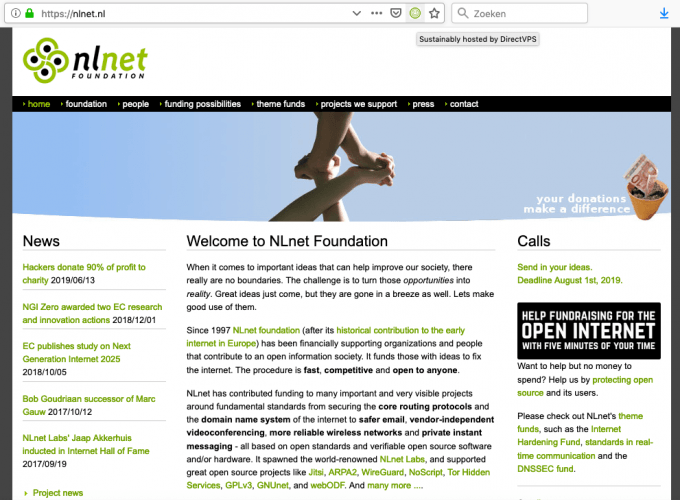NGI supported search tool Open Green Web filters sustainable sites

When you think of climate change, do you consider the carbon footprint of your favorite websites or the cloud service that stores your holiday photos? The world wide web is a vital infrastructure for modern life, but also a power-hungry technology with an appetite for more. The Open Green Web is a new ethical search engine based on the world’s largest dataset of sustainably hosted sites maintained by the Green Web Foundation that will filter only ‘green’ hosted search results. “Even if just a few users activate this radical search option, the issue can become more prominent in the eyes of platform owners both big and small.”
Global temperatures are rising and the world needs to switch from fossil fuels to renewable energy as soon as possible. Sustainable technology is the only way forward: electric cars instead of gas guzzlers, solar panels and wind mills instead of coal-based power plants. But have you ever realised we also need to green the web? It takes massive amounts of energy to keep the internet online and this power consumption is only set to increase as we install ‘smart’ devices and sensors everywhere and use increasingly complex cloud computing.
The Green Web Foundation envisions an internet that runs entirely on renewable energy and creates tools that help to speed up this transition. Through browser plugins users can check the ‘greenness’ of the sites they visit and search results they see: type a query into Google, Bing or Yahoo and the browser app underlines sustainably hosted sites with a fitting green dashed line. This has resulted in a database that contains more than 1.5 billion observations, detailing who hosts a site, where it is hosted and whether it is hosted ‘green’, with renewable energy, or ‘grey’ with fossil-based electricity. Now the foundation wants to take green search one step further and introduce a search engine that only shows sustainably hosted sites and services. René Post, daily manager of the Green Web Foundation, explains why a sustainable Next Generation Internet needs an ethical search engine.
The Open Green Web receives funding and support from the NGI initiative and was selected by the NGI Zero open call for improving search and discovery.

Greening the web is an important and complex issue with many technical challenges to solve and different stakeholders to engage with, like users and hosting providers. Why does the Green Web Foundation now focus on search and discovery as the next step forward?
From the start in 2011 we have been looking for ways to influence the search behavior of web users for the following two reasons: First, to empower users that really care about this issue so they can see before they visit a site if it is green hosted or not. Secondly, by creating this functionality within The Green Web browser addons website owners learn that a part of their user base knows what sites are hosted grey or green and that this can influence their browsing behavior. So the empowerment of users raises awarenees of website owners.

The PageModification function that our browser addons use to show what search results are hosted green is an extremely powerful tool that could do much more. In principle we could rearrange search results based on greenness, or even completely filter out everything that is not green hosted. With the rise of the hackable and open-source meta-search engine Searx, we see the perfect vehicle to implement this last option as a matter of choice, just an option that some users could activate if they wanted to. At the same time, this option gives us a glance into the future where the internet will run completely on renewables. So the Open Green Web project is completely inline with the long-term vision of The Green Web Foundation.
Most search engines favor response time and personalized results over user customization and control. How should ethical and sustainable search filtering be balanced against result quality?
For us, that is completely up to the user. But we believe that by giving people a choice, even if only a small number of them activate this radical filtering option, the issue might become more prominent for platform and website owners. From our experience with the hosting world – we have spoken to over 1,000 hosters from more than 60 countries in the last eight years – money is never the issue, it is just about attention. If this tool can help direct attention to the environmental choices hosters make and how these choices can influence the way users perceive their brand, the project is already worth the effort.
For many users online search is an everyday starting point that deeply influences how they see the internet and perhaps even the state of the world in general. What impact can ethical filtering have on how people view sustainability and the importance of a greener internet?
If you look at the economic dynamics around sustainable consumption and the users that will be attracted to ethical online search, platforms and site owners have every reason to take their sustainability much more serious. It is clear to us that the discussion is slowly but certainly heating up: practices that are ‘just business’ today (like Shell investing roughly 100 million euro per *day* in further destabilizing our climate) could easily become unwanted behavior tomorrow. I think that this application can help show us the future. People can experience first-hand how using internet platforms powered by fossil fuels is unethical.
It is a bit like when Dutch journalist Teun van der Keuken tried to get himself arrested in 2005 because he bought a chocolate bar even though he was fully aware that the cacao was produced by slave labour in Africa. At that time everybody thought he was crazy. But now Tony Chocolonely, which Van der Keuken founded, is the largest chocolate brand in the Netherlands and fair-trade cacao has become the de-facto standard that other brands had to follow because of this trailblazing newcomer. The Green Web Foundation has no commercial motive, but our ethical filter certainly will influence the current paradigm of online search.

